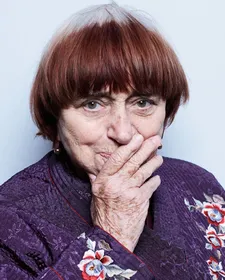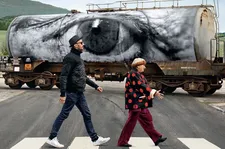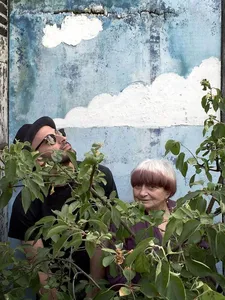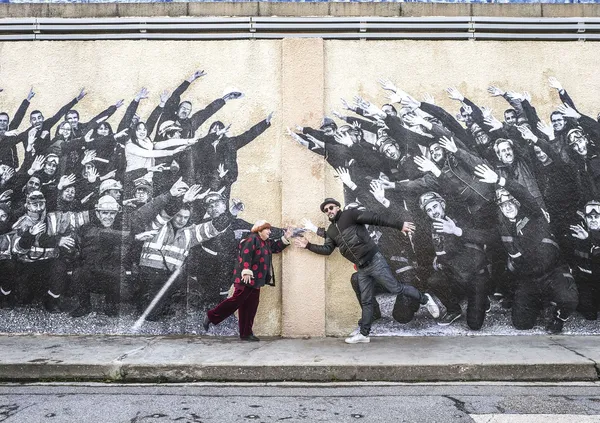By her own admission Agnès Varda has always been an outsider, existing as she describes it “on the margins”. Along with Jean-Luc Godard she is, at 89, one of the only surviving members of the New Wave (the movement that put filmmaking into freefall). She is a force of nature who has the strength (despite failing eyesight) and determination to continue making films with a captivating simplicity.
The last few months have seen her receive an honorary Oscar for her contribution to the world of cinema over the decades and the selection of her latest offering Faces Places (Visages Villages) - made with the installation artist known as JR - as a contender for best documentary Oscar. It’s a road movie of sorts as the pair of them traverse French village life, interacting with people from all walks of life, to deliver an examination of art and the human spirit as well as a treatise on the passing of time and what looms in the future.
Looking like a favourite great great grandmother, Varda clearly has become energised with all the attention. She plonks herself down in a deep and comfortable sofa in a Parisian hotel de luxe and immediately proclaims she will need help to extract herself from its embrace. She doesn’t so much give interviews as embark on a monologue, barely giving herself time to draw breath.
 |
| Agnès Varda: 'I have never made any money from my films but I have won prizes and recognition. I have been on the margins forever'
Photo: UniFrance |
“We were like go-betweens, capturing pieces of life everywhere, taking pictures, filming and making a portrait. We brought our imaginations to the world of work. We had such fun with meeting people. It was a bit like a sociological work but made with joy rather than seriousness. By choosing different places we added a whole variety of experience,” she says.
“We shot one week a month over a period of 18 months. I am strong but not so strong that I can shoot for any longer at any one stretch. My daughter Rosalie who worked as a costume designer, joined our company and she produced the film. She found the money and told me to take my time. The editing stage took longer than the shoot because at that point the film takes shape. We wanted to take the audience by the hand and lead them here and there.”
JR is known for the immediacy of his work. He travels throughout the world in a truck that houses a photo booth, instantly printing pictures of the people he encounters. “I feel in love with that truck even before meeting JR,” says the octogenarian. He decorates public buildings and neighbourhoods with portraits of local people who are often ignored, making them not only visible, but monumental. In one of the memorable parts of Faces, Places he sets grandly scaled photographs of miners, drawn from a collection of old postcards of Varda’s, on a row of miner’s cottages in northern France due to be demolished.
 |
| Agnès Varda and JR: 'We were like go-betweens, capturing pieces of life everywhere' Photo: UniFrance |
As the only female director associated with the New Wave, Varda was always assured of unique place in the annals of le cinéma français. She studied art history at the Sorbonne in 1946. She made her first film La Pointe Courte in 1954, edited by Alain Resnais, which is regarded as “the first film of the Nouvelle Vague.”
She struggled as a single mother in the Paris of the Fifties, when not only were birth control and abortion illegal, but also legal distinctions were made between legitimate children and illegitimate ones. Her partner was the director Jacques Demy whom she lovingly portrayed after his death in Jacquot de Nantes in 1993. Besides daughter Rosalie she has a son Mathieu Demy, an actor and also director.
Varda, whose father was Greek and mother French, was born in Brussels on May 30, 1928. She and her family fled to France from the occupying Germans and she grew up in the Midi. She began her career as a photographer for Jean Vilar’s Avignon Festival. She continues to live with her beloved cats in the original family home in the Rue Daguerre in the 14th arrondissement, near Montparnasse, where she and Demy set up the production and distribution company Ciné Tamaris. The buildings around a courtyard first served as a studio for her photographic activities - it was there she took portraits of such luminaries as Delphine Seyrig, Gérard Philippe and Sami Frey.
 |
| JR and Agnès Varda: 'There is a 55-year age gap between JR and myself but we shared the same feelings' Photo: UniFrance |
Asked to cite her most memorable film, she chooses Cléo from 5 to 7 - a portrait of a woman filmed in real time - rather than the celebrated Vagabonde (about a homeless young girl played by a then unknown Sandrine Bonnaire). “Cinephiles everywhere love Cléo” she says proudly. She had most fun, she declares, working on 100 Nights, a film for the centenary of cinema. “The casting was incredible - Delon, Deneuve, Belmondo, Moreau, Mastroianni, Michel Piccoli and Julie Gayet. I enjoyed doing it so much but nobody went to see it.”
As for that honorary Oscar, Varda, who once lived in California in the Sixties to make Lion’s Love, is bemused and bewildered. “I have never made any money from my films but I have won prizes and recognition. I have been on the margins forever. They all came to see me receive the award - there was Tom Hanks, Steven Spielberg and Richard Gere and so on. I was imagining what they would all be worth in money terms. You see I was never bankable, I could not bring any money ever to the table. I like the friendships and, yes, the admiration but I don’t want to make a big fuss about it. I will go on working as long as I am able!”
What of her chances in the Best Documentary Oscar stakes? “We are nominated and may be that is enough. I don’t think we will win because it is French speaking,” she suggests with a shake of her head. With that Varda extricates herself nimbly from the sofa and bustles off to her next encounter, leaving her minders feebly following in her wake.
Faces Places will screen at Glasgow International Film Festival 25 February at 6.15pm at Cineworld.
It is on release in the UK from September 7 (Curzon Artificial Eye)
Richard Mowe interviewed Agnès Varda at the Unifrance Rendez-vous with French Cinema in Paris






















